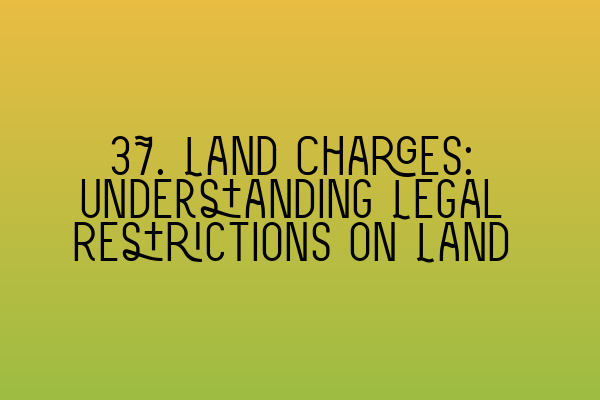37. Land Charges: Understanding Legal Restrictions on Land
Welcome to the blog of SQE Property Law & Land Law! In this post, we will dive deep into the topic of Land Charges and explore the various legal restrictions that may affect land.
Land Charges play a crucial role in property transactions, as they provide important information about the property’s history and any legal burdens or obligations attached to it. As a solicitor, it is essential to have a comprehensive understanding of Land Charges and their implications when advising clients. So, let’s get started!
What are Land Charges?
Land Charges are registers that contain information about legal restrictions, obligations, or interests affecting land or property. These charges are vital in property transactions as they ensure that all parties involved have access to important information about the land being bought or sold.
There are various types of Land Charges that can be registered, and each has its own significance and effect on the land. Some common types of Land Charges include:
- Restrictive Covenants
- Easements
- Mortgages
- Notices of Matrimonial Proceedings
- Legal Charges
Let’s take a closer look at each of these Land Charges:
1. Restrictive Covenants
Restrictive Covenants are legal agreements that restrict the use or development of land or property. They are typically imposed by the original owner or developer of the land to maintain a certain aesthetic or preserve specific aspects of the property. These covenants may limit the homeowner’s ability to make alterations or changes to the property, such as building extensions or changing the property’s use.
It is essential for potential buyers or owners to be aware of any Restrictive Covenants on the land they are interested in, as they may impact their ability to use or develop the property according to their preferences or plans.
2. Easements
Easements are rights that allow one party to use or access another party’s land for a specific purpose, which may include rights of way, drainage, or utilities. Easements are typically created when one party ‘grants’ the right to another party or when there is a longstanding practice or custom that establishes the right.
When dealing with property transactions, it is crucial to determine if any Easements exist on the land, as they can affect the buyer’s or owner’s rights, obligations, and the potential value of the property. For example, if there is an easement for a right of way, the owner of the land may not be able to restrict or obstruct access to a neighboring property.
3. Mortgages
Mortgages are a common Land Charge that is registered when a property is used as collateral for a loan. The lender registers a Charge against the property, securing their interest in the event that the borrower defaults on the loan. It is important to note that the presence of a Mortgage does not necessarily mean the property cannot be sold; however, the Mortgage needs to be paid off or transferred to the new buyer.
When dealing with property transactions involving Mortgages, it is crucial to ensure that all necessary steps are taken to discharge or transfer the Mortgage and secure the buyer’s interests.
4. Notices of Matrimonial Proceedings
Notices of Matrimonial Proceedings are a type of Land Charge that can be registered when there is a dispute or legal proceeding related to a property due to a divorce or separation. These notices protect the interests of parties involved in matrimonial proceedings and ensure that any potential sale or transfer of the property is subject to the outcome of the legal proceedings.
When advising clients involved in property transactions with Notices of Matrimonial Proceedings, it is crucial to consider the potential implications and seek legal advice to protect their interests.
5. Legal Charges
Legal Charges are registered to secure the repayment of debts or obligations. They can be registered against the property by various parties, including the government, local authorities, or individuals or companies to whom the property owner owes money. If there is an outstanding Legal Charge on the property, it can affect the owner’s ability to sell or transfer the property until the debt is settled.
When dealing with property transactions involving Legal Charges, it is important to conduct thorough due diligence to identify any outstanding debts or obligations and ensure that appropriate steps are taken to protect the buyer’s interests.
Conclusion
Understanding legal restrictions on land is crucial for solicitors, buyers, and sellers alike. Land Charges provide valuable information about the history and legal burdens attached to the land, allowing all parties to make informed decisions and protect their interests.
In this blog post, we have explored the various types of Land Charges, including Restrictive Covenants, Easements, Mortgages, Notices of Matrimonial Proceedings, and Legal Charges. It is essential for solicitors to have a comprehensive understanding of these Land Charges and their implications when advising clients in property transactions.
At SQE Property Law & Land Law, we provide expert legal advice and assistance with all aspects of property law. If you require professional assistance or further information related to Land Charges or any other property law matters, please do not hesitate to contact us.
Related Articles:
